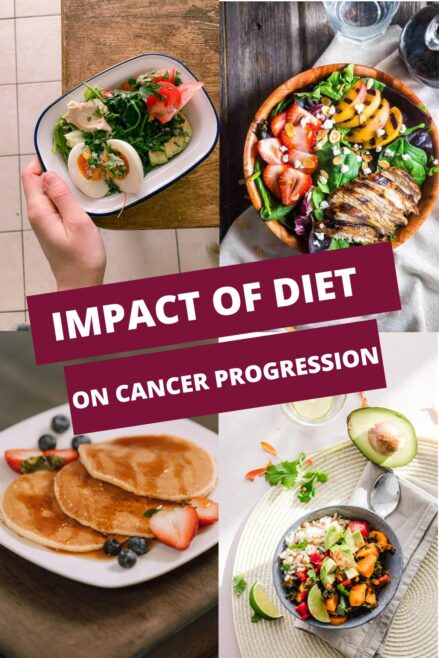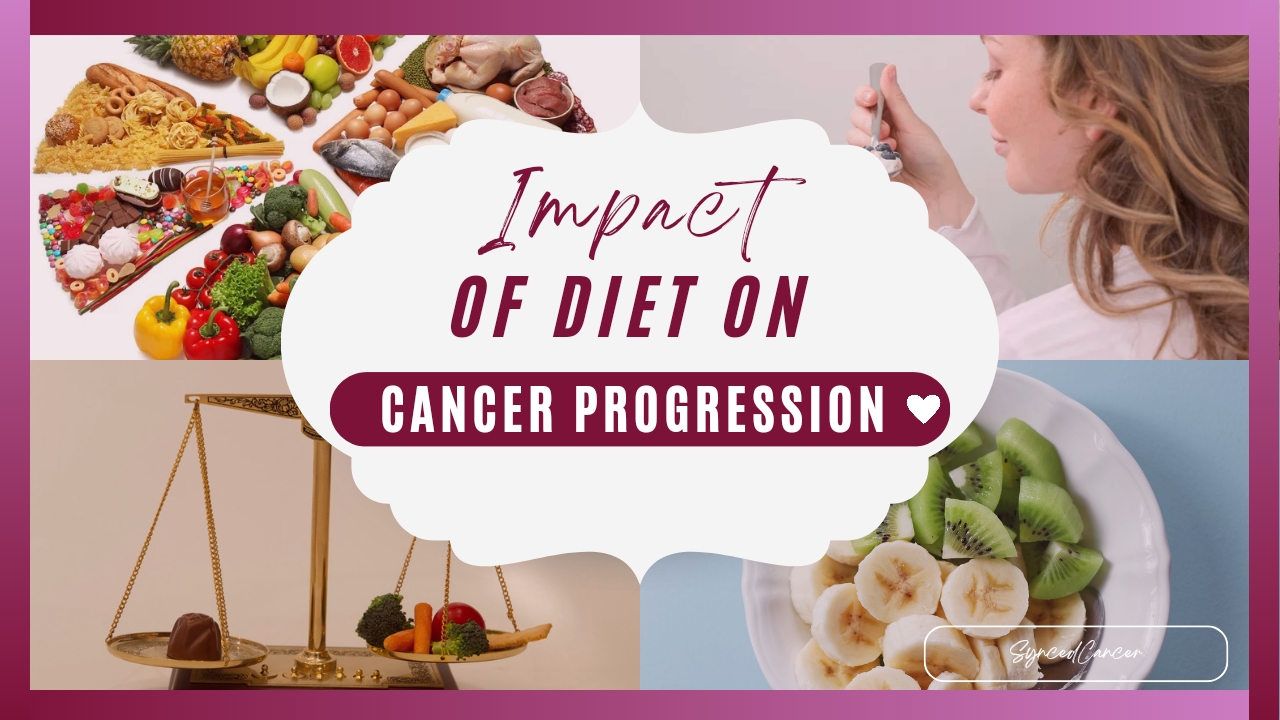The relationship between diet and cancer progression is a complex and multifaceted one, with accumulating evidence highlighting the profound influence of nutrition on tumor growth, metastasis, and treatment outcomes. Tumor cells display increased sensitivity to growth factors that would increase proliferation of cancer cells and disregard the controls that would otherwise tightly-regulate cell cycle. Diet is a major factor affecting growth factor levels as well as other aspects related to cell proliferation and can influence the onset and development of cancers in a variety of different ways. This blog post aims to delve into the various ways in which diet impacts cancer progression, from promoting tumor development to influencing response to therapy.

- Promoting Tumor Growth and Initiation
Diet plays a crucial role in cancer progression, both in promoting tumor growth and initiation. Here’s how:
a. Promoting Tumor Growth
Inflammatory Foods: Diets high in processed foods, sugars, unhealthy fats, and red meats can promote inflammation in the body. Chronic inflammation is linked to increased cancer risk and can create an environment favorable for tumor growth.
Insulin Resistance: Diets high in refined carbohydrates and sugars can lead to insulin resistance, where cells become less responsive to insulin. High insulin levels in the blood can promote cell growth, including cancer cells.
Hormonal Imbalance: Certain foods, especially those high in saturated fats and hormones, can disrupt the body’s hormonal balance, which may fuel the growth of hormone-sensitive tumors such as breast and prostate cancers.
Obesity: Diets high in calorie-dense foods can lead to obesity, which is a significant risk factor for many types of cancer. Adipose tissue produces hormones and cytokines that can promote cancer growth.
b. Initiating Tumor Growth
Carcinogens: Some components of diet, like certain additives, preservatives, and cooking methods (like charred meats), introduce carcinogens into the body, which can initiate tumor growth.
Genetic Damage: Diets low in antioxidants, vitamins, and minerals may not provide enough protection against oxidative stress. This can lead to DNA damage and mutations that initiate cancer.
Microbiome Alteration: Certain diets can disrupt the balance of gut bacteria (microbiome). Dysbiosis in the gut microbiome has been associated with the initiation of colorectal cancer and possibly other cancers.
Pro-inflammatory diet: Diets high in processed foods, saturated fats, and refined sugars can promote chronic inflammation, which creates an environment conducive to cancer development and progression.
- Fueling Cancer Cell Metabolism
Diet can significantly impact cancer progression by fueling cancer cell metabolism. Cancer cells have unique metabolic demands, and certain dietary factors can provide them with the energy and nutrients they need to grow and spread. Here’s how diet affects cancer cell metabolism:
Glucose and Carbohydrates:
- Cancer cells often rely on glucose as their primary source of energy, even in the presence of oxygen (aerobic glycolysis or the “Warburg effect”).
- Diets high in refined carbohydrates and sugars can provide ample glucose, fueling cancer cell growth and proliferation.
- High-glycemic index foods can lead to spikes in blood sugar levels, promoting insulin secretion, which in turn stimulates cancer cell growth.
Fatty Acids:
- Cancer cells require fatty acids for membrane synthesis, energy production, and signaling.
- Diets high in saturated fats, trans fats, and omega-6 fatty acids may promote cancer progression by providing cancer cells with the necessary fatty acids.
- Omega-3 fatty acids, found in fatty fish and certain plant sources, may have anticancer properties and can compete with pro-inflammatory omega-6 fatty acids.
Amino Acids:
- Amino acids are essential for protein synthesis, cell growth, and proliferation.
- Certain amino acids, such as glutamine, are particularly important for cancer cell metabolism. Glutamine provides carbon and nitrogen for biosynthetic processes.
- Diets rich in protein, especially animal protein, can supply cancer cells with the amino acids they need.
- Restricting certain amino acids, such as glutamine, through dietary interventions or pharmacological means, has been explored as a potential cancer treatment strategy.
Micronutrients and Antioxidants:
- Micronutrients like vitamins and minerals play crucial roles in cellular metabolism and antioxidant defense mechanisms.
- Diets lacking in essential micronutrients, such as vitamins C, E, and A, as well as selenium and zinc, may impair antioxidant defenses and promote oxidative stress, which can contribute to cancer progression.
- Conversely, diets rich in antioxidants from fruits, vegetables, and nuts can help reduce oxidative stress and potentially slow cancer cell growth.
Metabolic Adaptations:
- Cancer cells exhibit metabolic plasticity and can adapt to varying nutrient availability.
- Dietary interventions like calorie restriction, intermittent fasting, or ketogenic diets aim to restrict specific nutrients or alter metabolic pathways to hinder cancer cell growth.
- Modulating Cancer Microenvironment
Diet can influence cancer progression by modulating the cancer microenvironment, the surrounding milieu of cells, molecules, and structures in which cancer cells exist. Here’s how diet affects the cancer microenvironment:
Inflammation:
- Chronic inflammation in the tumor microenvironment promotes cancer progression by stimulating cell proliferation, angiogenesis (formation of new blood vessels), and metastasis.
- Diets high in processed foods, saturated fats, sugars, and low in fiber can promote inflammation in the body, which in turn contributes to an inflammatory microenvironment favorable for cancer growth.
Immune System Function:
- The immune system plays a crucial role in surveilling and eliminating cancer cells. A well-functioning immune system can recognize and destroy cancer cells.
- Diets rich in fruits, vegetables, and whole grains provide essential nutrients and antioxidants that support immune function.
- Conversely, diets high in processed foods, unhealthy fats, and excess calories can impair immune function and weaken the body’s ability to fight cancer.
Angiogenesis:
- Angiogenesis is the process of forming new blood vessels, which is critical for supplying nutrients and oxygen to cancer cells.
- Certain dietary factors can influence angiogenesis. For example, foods rich in anti-angiogenic compounds like certain fruits, vegetables (such as tomatoes, berries, and green tea), and spices (like turmeric) can inhibit blood vessel formation in tumors, thereby slowing cancer progression.
pH Balance:
- The pH balance of the microenvironment can affect cancer cell growth. Cancer cells often thrive in acidic environments.
- Diets high in acidic foods, such as processed meats, refined grains, and sugary beverages, can contribute to an acidic pH, promoting cancer progression.
- Conversely, diets rich in alkaline-forming foods like fruits, vegetables, and legumes may help maintain a more alkaline pH, which can inhibit cancer growth.
Gut Microbiome:
- The gut microbiome plays a crucial role in cancer progression by influencing inflammation, immune function, and metabolism.
- Dietary fiber from fruits, vegetables, and whole grains promotes a healthy gut microbiome by feeding beneficial bacteria.
- Certain dietary components, like artificial sweeteners, emulsifiers, and high-fat diets, can disrupt the gut microbiome, leading to inflammation and potentially promoting cancer progression.
Hormonal Balance:
- Hormones can influence the growth of hormone-sensitive cancers, such as breast and prostate cancers.
- Diets high in saturated fats and low in fiber can increase circulating estrogen levels, which may promote the growth of hormone-sensitive tumors.
- Consuming phytoestrogen-rich foods, such as soybeans and flaxseeds, may have a protective effect by modulating estrogen levels.
- Impact on Treatment Outcomes
Chemotherapy resistance: High-fat diets and obesity have been linked to chemotherapy resistance in various cancer types, possibly due to altered drug metabolism and increased inflammation.
Radiotherapy effectiveness: Poor nutritional status and micronutrient deficiencies can impair DNA repair mechanisms and increase susceptibility to radiation-induced damage, reducing the effectiveness of radiotherapy.
Immunotherapy response: Diet-induced inflammation and dysbiosis can negatively impact response to immunotherapy by dampening immune activation and promoting immune evasion mechanisms.
- Anti-Cancer Dietary Strategies
Plant-based diets: Diets rich in fruits, vegetables, whole grains, and legumes provide phytochemicals, antioxidants, and fiber, which have anti-cancer properties and promote overall health.
Mediterranean diet: This dietary pattern, characterized by high consumption of olive oil, fish, fruits, and vegetables, has been associated with a reduced risk of cancer and improved treatment outcomes.
Caloric restriction: Moderate caloric restriction and intermittent fasting have shown promise in slowing cancer progression and enhancing response to therapy by reducing inflammation, improving metabolic health, and enhancing autophagy.
Conclusion
The impact of diet on cancer progression is profound and multifaceted, influencing various aspects of tumor biology, the microenvironment, and treatment response. By adopting a healthy and balanced diet, rich in nutrient-dense foods and low in pro-inflammatory components, individuals can mitigate the risk of cancer progression and improve treatment outcomes. However, further research is needed to elucidate the complex interactions between diet, cancer biology, and therapeutic interventions for more personalized and effective dietary strategies in cancer care.
REFERENCES
National Library of Medicine – https://www.ncbi.nlm.nih.gov/pmc/articles/PMC6301051/



What do you think?
It is nice to know your opinion. Leave a comment.